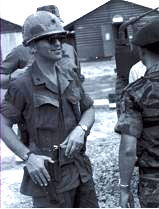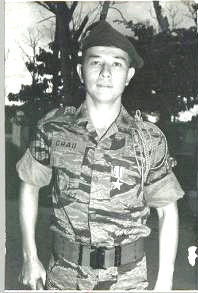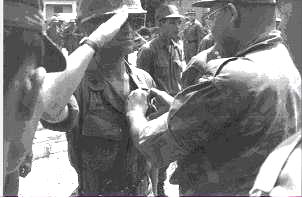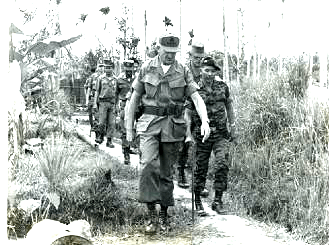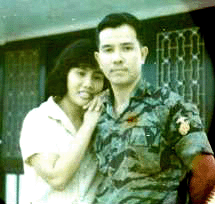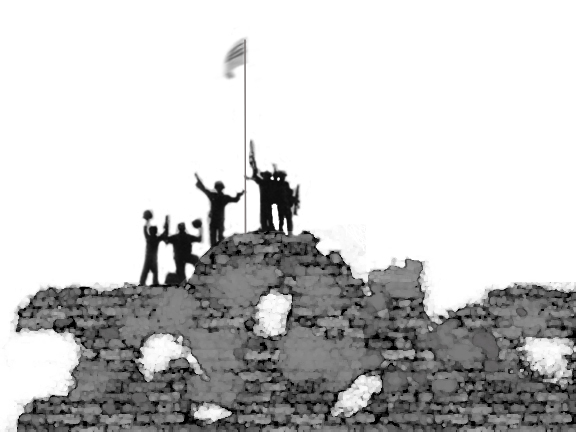 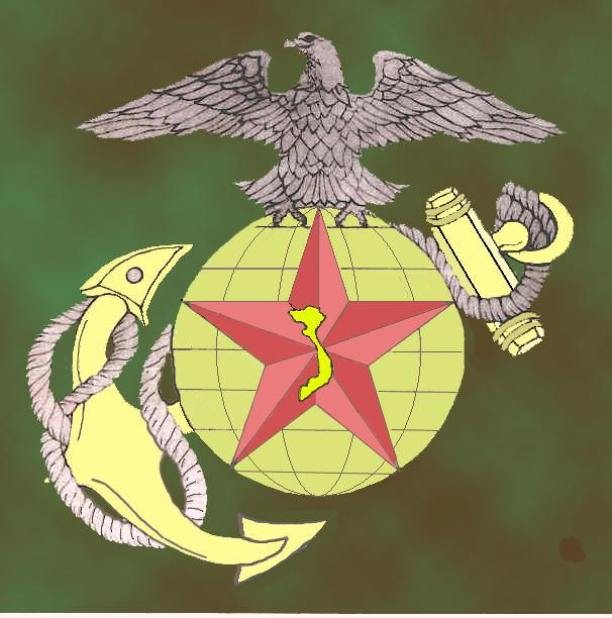
| Home | Memory | Young Marines | VNMC Combat | News | Link | Vietnamese | |
||||||||||||||||||
Nguyen Minh Chau – Distinguished Vietnamese Comrade-in-Arms
[The following is a description of Lieutenant Colonel Nguyen Minh Chau, District Chief of Di An District, Republic of Vietnam, 1967-75 by William C. Haponski, Colonel, U S Army, Retired. The association of Chau, then a major of Marines, and Haponski, then a lieutenant colonel commanding 1st Squadron, 4th Cavalry, 1st Infantry Division, came about during January - July 1969 when one of Haponski’s missions was to work closely with Chau in pacification and Vietnamization of Di An District, about twelve miles northeast of Saigon. The district comprised over thirty hamlets and villages, and totaled about 50,000 people.] I knew Chau by reputation a month or so before I met him. His third wound, sustained in combat near the DMZ in 1966, had left him crippled on the right side, and he leaned on a cane. His fourth wound came in October 1968 just outside the American compound at Di An, two months before we met. An assassination attempt left an AK 47 bullet lodged in his lung, nearly finishing him. Major Chau was highly respected by senior American and Vietnamese military and civilian officials as a thoroughly honest, compassionate, effective district chief. I heard he was the best in over two hundred districts in Vietnam and was soon to discover first-hand why he was so highly lauded. On my first full day in command, 6 Jan 69, while he was still in pain and recovering from his latest wound, Chau led a district force against a Viet Cong contingent and captured a high-ranking VC official, an action I observed and for which he received the U S Bronze Star for Valor. My letters, tapes, and journals of the time reflect often on this extraordinary person. For example, 16 Jan 69: “Major Chau came to see me today. Limping, twisted by his wounds, he is an inspiration. He leads his people, protects them, helps them. From 19 Feb 69: “One of the great satisfactions in this job is working with Major Chau and his forces. We have a very close cooperative arrangement, and he is a fine man, one of the greatest I’ve known.” During the six months he and I worked together his district gained noticeably in prosperity due to his efforts. The VC infrastructure was virtually eliminated, schools and roads were built, businesses flourished, and life for his people stabilized. The Vietnamese admired him, and he devoted himself to them. He deeply loved his wife and six children who lived with him in the district compound at Di An.
Able to find out nothing about him after the fall of South Vietnam in 1975, I feared the worst and for twenty-four years had presumed him to be dead. He, of course, would have been one of the first targets for revenge by the conquerors. In June of 1999, however, I was astonished to discover he had survived, and we talked by phone several times. I learned that during those last days Chau was commanding his forces, prepared to defend his district. The main enemy attack on Saigon, however, bypassed Di An, and when Saigon fell on 30 April 1975 he was ordered by his commander to surrender his district. In a letter to me Chau said, “It was the sombrest day of our life.” Fortunately for him he was taken by NVA troops rather than the local VC, and he spent three terrible years in prison camps in North Vietnam, barely surviving starvation, disease, and mistreatment. He said, “During the time in concentration camps I thought that I would never meet my American friends again. Because of my handicap they released me after 3 years.” He made his way back to his family in Thu Duc, just outside Saigon. Chau wrote, “But, 2 months later the local communists came to my home to take me to prison again. I believed that they would do a terrible revenge on me because I had destroyed many of their soldiers and infrastructures. I was sure they would kill me that time. I had no way to escape, so I decided to make a suicide by taking an overdose of medication.” He fell immediately into a coma and the squad of soldiers said they would “take care of him.” His wife and neighbors created such a fuss, though, that the squad let them take him to a local hospital. The details of his subsequent escape cannot be revealed because of potential danger to those who helped him, but the essence is that after several days he awoke from the coma, eluded his guards, and made his way into the civilian populace which shielded him for eighteen months, moving him from place to place weekly. He said, “It was a very difficult and depressed time for me and my family.” His courageous and resourceful wife finally was able to arrange his escape by boat to Thailand, and six months later she got herself and their six children out by boat to Malaysia. The family was eventually reunited in California in 1980. After a difficult time in the U S at first, and one month after his arrival in November1979, Colonel Chau was able to get work with a refugee resettlement organization . Since 1991 until he retired in January 2000 he had his own immigration consultant business, and since 1981 Mrs. Chau has been a medical translator at Santa Clara Valley Medical Center. All six children, four girls and two boys, received degrees from California colleges in computer, electronics, chemical, and aviation engineering and are high tech professionals in Silicon Valley. The whole family is proud to be American.
In Di An so many years ago, I knew Chau to be a sweet, gentle man who was a courageous, determined, respected field commander and civic government official. My life has been enriched by him. He said in a letter to me, “ I am always appreciating the noble sacrifice of all Vietnam veterans who were fighting the war in the dense jungles of Vietnam for our freedom. My wife and I understood that the American GIs must leave their loved ones behind in their country to go fighting a very difficult war very far from their homeland. My wife always advised me to love the American soldiers as we love our soldiers. She understood that all American wives and children were suffering too much as she and other Vietnamese wifes were, when we left our families at Saigon to go fighting in 4 regions of South Vietnam. She and my children suffered a lot every time I got a deadly wound.” Colonel Chau, I thank you for what you did for your country, for me and my troops, my family, and for America. I am proud to have been your comrade-in-arms, and to be your friend.
Fort Hood, Texas, 1 April 2000
Additional information on Nguyen Minh Chau:
American medals: Siver Star Bronze Star “V” Army Commendation Medal
email bixitrum@yahoo.com l Trang chính l Chiến sĩ Vô Danh l Young Marines l Sư Đoàn TQLCVN l Tin tức nội bộ l Trang Web bạn l |
||||||||||||||||||
|
||||||||||||||||||
|
||||||||||||||||||
